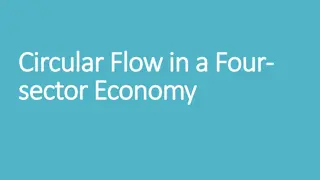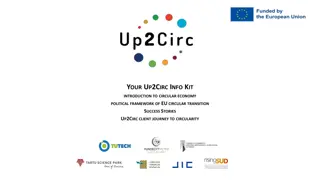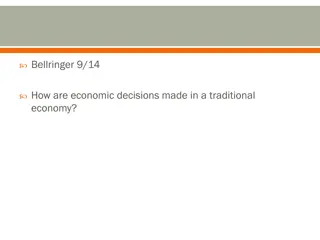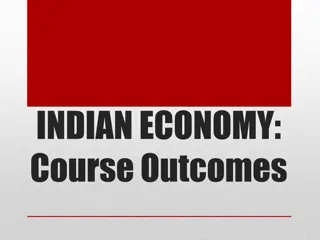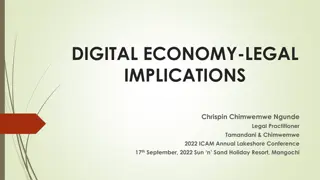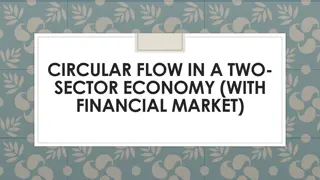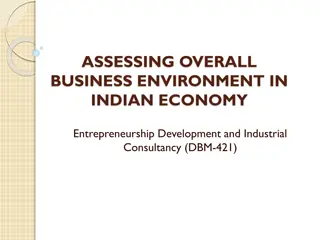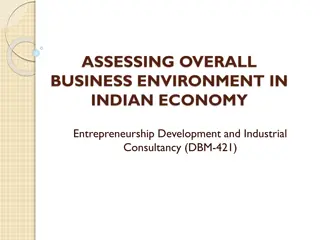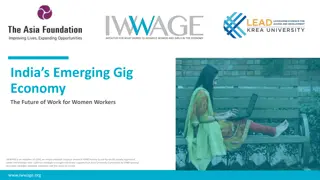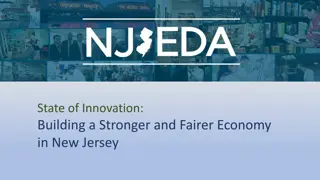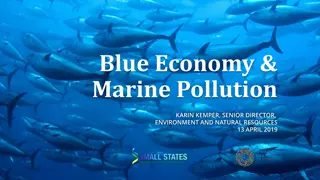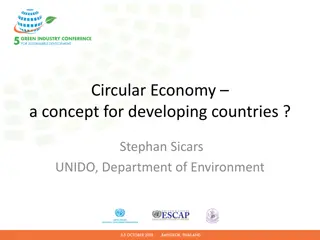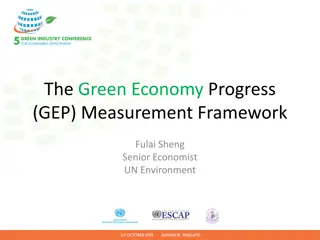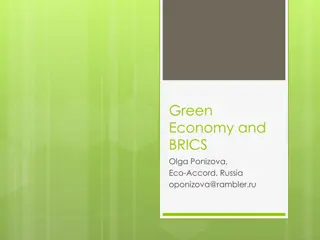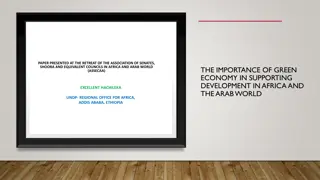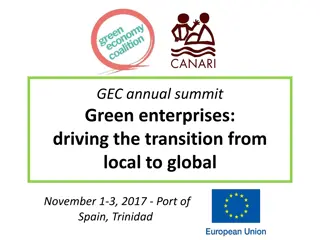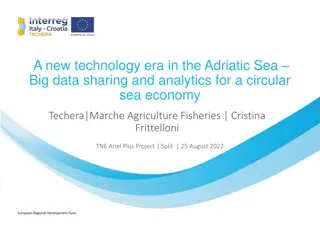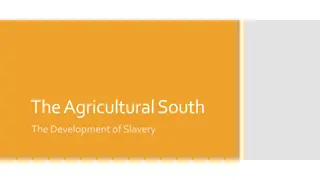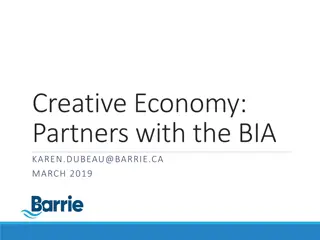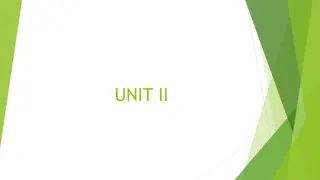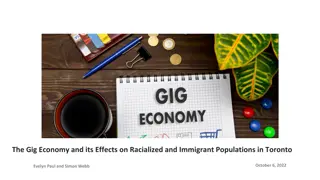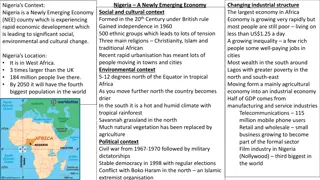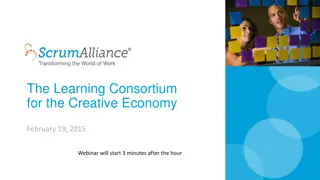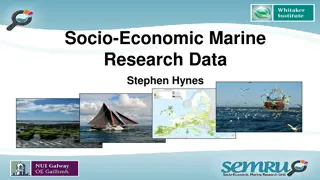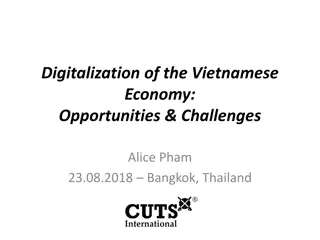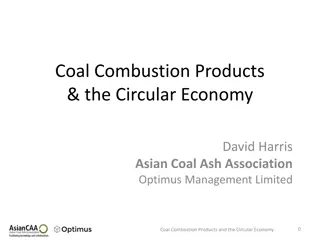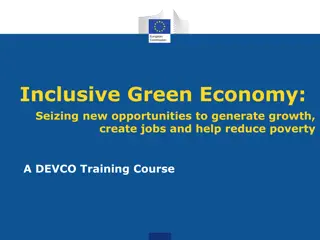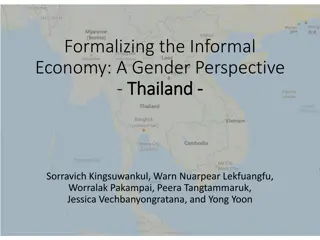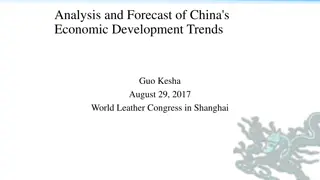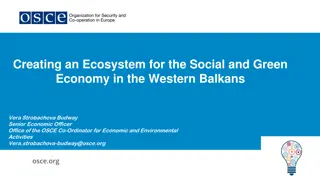Sustainability and the Blue Economy Concepts
The intertwining concepts of sustainability and the blue economy, focusing on historical developments, environmental protection events, and the emergence of sustainability science. Discover the pillars supporting a sustainable blue economy and pathways for inclusive development.
15 views • 40 slides
Circular Flow in a Four-Sector Economy Explained
The circular flow in a four-sector economy involves households, firms, government, and the foreign sector. Each sector plays a crucial role in money flows and payments, contributing to the continuous flow of income. The financial market also has a significant impact on the economy by accumulating sa
3 views • 8 slides
Glossary of Key Terms
Explore essential terms in economics such as command economy, consumer, demand, economic system, free enterprise system, goods, innovation, market economy, marketplace, mixed economy, needs, producer, profit, resources, scarcity, services, supply, technology, trade-off, traditional economy, and want
3 views • 6 slides
Accelerating Towards a Circular Economy Future
The circular economy presents a vital solution to tackle climate change by focusing on regenerative growth, reducing resource consumption footprint, and enhancing material use efficiency. The EU's Circular Economy Action Plan aims to usher in a sustainable future through decoupling economic growth f
2 views • 19 slides
Leveraging Non-Oil Exports for Nigeria's Blue Economy Growth
Nigeria Export Promotion Council (NEPC) focuses on diversifying Nigeria's economy by promoting non-oil exports for sustainable growth. The Blue Economy concept involves sustainable use of ocean resources for economic development. Nigeria's abundant ocean resources such as maritime transportation, fi
0 views • 20 slides
Economic Systems in the United Kingdom, Germany, and Russia
Economic decisions in traditional economies are based on customs and beliefs. The United Kingdom has a mixed market economy with a focus on service industries, while Germany's economy is export-based. Russia's economy leans towards a command system. By comparing these economic systems, one can see h
0 views • 11 slides
Understanding Indian Economy: Course Outcomes and Resources
Explore the course outcomes of the Indian Economy, covering economic development, policies, population growth, planning, agriculture, Kerala's economy, and resources for further study. Access government data and publications on the Indian economy for comprehensive learning.
0 views • 9 slides
Advancing Circular Economy Through Flexible Packaging Initiative
Flexible Packaging Initiative is driving a circular economy in Europe by emphasizing the importance of flexible packaging, showcasing key benefits, and outlining steps to ensure circularity in the recycling value chain. The initiative supports harmonized sorting labels, eco-modulated fees, and the p
5 views • 5 slides
Legal Implications of the Digital Economy in Malawi
Explore the legal implications of the digital economy in Malawi as discussed at the ICAM Annual Lakeshore Conference. Topics include the Electronic Transactions and Cyber Security Act, principles of implementation, Malawi CERT, data privacy, and the significance of the digital economy in transformin
0 views • 44 slides
Understanding Circular Flow in a Two-Sector Economy with Financial Market
In a two-sector economy with a financial market, households and firms engage in savings, investments, and borrowing through the financial market, unlike the simple circular flow assumption where no savings are made. This interaction between households, firms, and the financial market plays a crucial
0 views • 4 slides
Overview of Modern Business Environment in Indian Economy
Modern business in the Indian economy is characterized by large size, oligopolistic nature, diversification, global presence, technology orientation, and changing government regulations. The Indian economy features a mixed economy with both private and public enterprises, low per capita income, uneq
0 views • 14 slides
Overview of Business Environment and Economy in India
Business environment in India encompasses a mix of large, oligopolistic, diversified, and technologically oriented enterprises. The Indian economy is characterized by a mixed economy, low per capita income, and limited entrepreneurial potential. External and internal factors influence business opera
0 views • 14 slides
Insights into India's Thriving Gig Economy and Future Work Trends
India's gig economy, spearheaded by initiatives like IWWAGE, is reshaping the future of work, particularly for women. Key questions revolve around the gig economy's impact, legislative frameworks, and COVID-19 repercussions. Academia investigates the rise of gig work, focusing on platforms like Uber
0 views • 11 slides
Transforming New Jersey's Economy for Growth and Equality
New Jersey aims to revitalize its economy by focusing on key goals for 2025, including driving job growth, increasing wages, fostering diversity in STEM fields, erasing gender and racial wage gaps, and reducing poverty in urban centers. The plan involves investing in people, communities, innovation,
3 views • 5 slides
Strategic Creativity in Tourism Business: Unleashing Innovation and Growth
Explore the dynamic landscape of strategic creativity in tourism business through the lens of the experience and attention economy. Discover how creativity-based approaches can reshape planning and generate novel opportunities in the tourism sector. Delve into the concepts of the experience economy,
5 views • 14 slides
The Blue Economy and Marine Pollution: A Comprehensive Overview
The presentation outlines the thriving ocean economy, the concept of the Blue Economy, the World Bank's approach, risks faced by oceans, and the impact of marine pollution on Small Island Developing States and coastal regions. It emphasizes sustainable development of oceanic activities, collaboratio
1 views • 12 slides
Circular Economy as an Opportunity for Developing Countries
Circular economy presents an opportunity for developing countries to generate wealth, reduce environmental footprint, and promote sustainable practices. By extending product lifetimes, reusing resources, and minimizing waste, developing nations can benefit from economic interests while complementing
0 views • 9 slides
The Green Economy Progress Measurement Framework Overview
The Green Economy Progress (GEP) Measurement Framework, spearheaded by Fulai Sheng, a Senior Economist at UN Environment, emphasizes an Inclusive Green Economy (IGE) as a tool for sustainable development. It addresses poverty, inequitable prosperity sharing, and planetary boundary concerns by integr
0 views • 6 slides
Insights into Social Economy and Social Dialogue Research Outcomes
Research outcomes from the Mesmer+ project at HIVA KU Leuven reveal misalignments in social dialogue inclusiveness, challenges faced by social economy entities, and the role of employers in the social economy. Recommendations include enhancing the role of social economy employers and promoting inclu
1 views • 7 slides
Entrepreneurship and Innovation in the Green Economy Conference Overview
This overview highlights the program's focus on green economy innovation, educational policies, and collaboration with international partners. It delves into Latvia's challenges and the significance of green innovation entrepreneurship in driving radical changes. The narrative extends to the Europea
0 views • 21 slides
Exploring the Green Economy and BRICS Cooperation
The discussion focuses on the importance of the green economy for BRICS nations, suggesting ways for collaboration, especially in addressing climate change and transitioning to a low-carbon economy. The BRICS countries play a crucial role in global stability and sustainable development. Features of
0 views • 22 slides
Transition to Green Economy in Kenya: Enabling Conditions by Dr. Charles Mutai
This presentation outlines the shift towards a green economy in Kenya, focusing on enabling conditions for sustainable development and poverty eradication. It discusses the concept of green economy, its benefits, and the global importance of transitioning to a more environmentally friendly economic
0 views • 22 slides
Challenges and Opportunities: Green Economy Impact in Africa and Arab World
The paper presented at the ASSECAA retreat highlights the importance of the green economy in supporting development in Africa and the Arab world amidst the global economic crisis. It discusses challenges such as slow recovery from COVID-19, geopolitical instability, and climate change effects, empha
1 views • 30 slides
Advancing Sustainable Development through Green Enterprises in the Caribbean
Caribbean Green Economy Action Learning Group focuses on promoting a Green Economy in the Caribbean region for sustainable development. The key principles include economic viability, social inclusion, environmental sustainability, resilience, and good governance. The program emphasizes the importanc
0 views • 9 slides
Techera Project Overview: Advancing Blue Economy in the Adriatic Sea through Big Data Sharing
Techera, a cluster project in the Adriatic Sea, aims to promote emerging technologies in the blue economy sector by capitalizing on previous projects like SUSHIDROP and PRIZEFISH. With a focus on data-driven solutions and innovation, Techera aims to enhance competitiveness and sustainability in the
0 views • 13 slides
The Impact of Collaborative Economy on Employment and Social Security in the EU
The European Parliament Committee on Employment and Social Affairs explored the effects of business models, including the platform economy, on employment and social security in the European Union. The collaborative economy, involving service providers, users, and intermediaries, creates opportunitie
0 views • 10 slides
The Impact of Pandemics on the Shadow Economy Performance
Pandemics have a significant impact on the shadow economy, influencing the legal economy in various ways. The shadow economy serves as a buffer for high unemployment rates and can contribute to budget revenues through legal spending. Studies suggest that a growing shadow economy may reflect dissatis
0 views • 12 slides
Development of Slavery and Cotton Economy in the Agricultural South
The development of slavery and the rise of the cotton industry in the Agricultural South played a crucial role in shaping the region's economy and society. From the introduction of crops like tobacco, rice, and indigo to the emergence of cotton as a dominant crop supported by innovations such as the
0 views • 20 slides
Cultivating a Vibrant Creative Economy in Barrie: The Downtown Creative Corridor Initiative
The Creative Economy initiative in Barrie, led by partnerships with the BIA and spearheaded by Karen Dubeau, focuses on combining culture, innovation, entrepreneurship, and the arts to build a thriving community ecosystem. Through capacity development, incubator programs, strategic infrastructure, a
0 views • 15 slides
Evolution of Services Marketing in the Modern Economy
The shift towards a service economy has transformed marketing practices, leading to the emergence of Services Marketing as a distinct discipline. This evolution highlights the unique characteristics of services, such as intangibility and simultaneous production-consumption. The 1980s mark a pivotal
0 views • 13 slides
Understanding the Impact of the Gig Economy on Marginalized Groups in Toronto
This report delves into the effects of the gig economy on racialized and immigrant populations in Toronto. It outlines research findings, stakeholder insights, and strategic recommendations to address the challenges faced by marginalized groups in the gig economy. The study aims to shed light on the
0 views • 25 slides
Nigeria's Emerging Economy: Opportunities and Challenges
Nigeria, a newly emerging economy in West Africa, has undergone significant social, environmental, and cultural changes. With a diverse population, multiple religions, and a mix of agricultural and industrial sectors, the country faces both opportunities and challenges in its path towards economic d
0 views • 14 slides
The Learning Consortium for the Creative Economy Webinar Summary
The webinar on The Learning Consortium for the Creative Economy discussed key topics such as agenda details, presenters' backgrounds, poll results, and insights on the Creative Economy and its importance. Participants engaged in discussions on topics like the Recap on the Creative Economy, Scaling o
0 views • 43 slides
Ireland's Marine Economy Research & Data Analysis
Explore Ireland's ocean economy through socio-economic marine research data, ecosystem service accounts, and the latest reports. Gain insights into turnover, GVA, and employment trends in various categories influencing the blue economy. Understand the dynamics and value of marine ecosystem services
0 views • 12 slides
Digitalization of the Vietnamese Economy: Opportunities & Challenges
This presentation delves into the digitalization of the Vietnamese economy, exploring the potential advantages and hurdles it brings. It discusses emerging digital opportunities for consumers, government, and businesses, as well as the impact of e-learning and the rise of digital applications. The d
0 views • 9 slides
Coal Combustion Products & the Circular Economy - Addressing Resource Flow Challenges
This discussion delves into the intersection of coal combustion products and the circular economy, emphasizing the need for continuous re-evaluation of resource chains, ecosystem metabolisms, and industrial innovations to ensure sustainable environmental practices and economic growth. Exploring the
0 views • 24 slides
Understanding the Inclusive Green Economy for Sustainable Development
Embrace the concept of an Inclusive Green Economy to create opportunities for growth, job creation, poverty reduction, and sustainable development. Learn the key principles, processes, and approaches of transitioning towards a greener economy, focusing on social and environmental sustainability. Exp
0 views • 20 slides
Formalizing the Informal Economy: A Gender Perspective in Thailand
Thailand has seen rapid economic development transforming its economy. Despite a large informal labor market, efforts have been made to formalize it with labor laws, social protection, and defining formal employment. The gender perspective is crucial in understanding and addressing informal economy
0 views • 15 slides
Analysis and Forecast of China's Economic Development Trends - Guo Kesha Presentation
The presentation by Guo Kesha at the World Leather Congress in Shanghai delves into the analysis and forecast of China's economic development trends. It discusses whether a new cycle has opened for the Chinese economy, the potential for an L-type growth platform, and initial research on economic tre
0 views • 22 slides
Advancing Social and Green Economy in Western Balkans
Creating an ecosystem for social and green economy in the Western Balkans is crucial for fostering peace, reducing disparities, and promoting sustainable business models. Initiatives like promoting innovation, job creation, and skills development among young entrepreneurs are key to driving growth a
0 views • 7 slides

